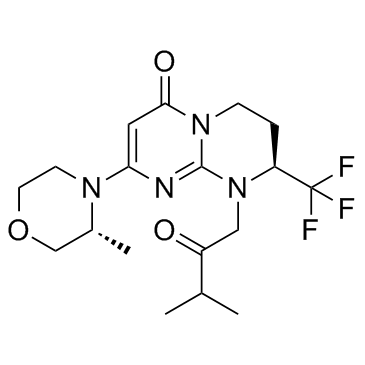1523404-29-6
| Name | Vps34-IN-2 |
|---|---|
| Synonyms |
4H-Pyrimido[1,2-a]pyrimidin-4-one, 6,7,8,9-tetrahydro-2-[(3R)-3-methyl-4-morpholinyl]-9-(3-methyl-2-oxobutyl)-8-(trifluoromethyl)-, (8S)-
(8s)-2-[(3r)-3-Methylmorpholin-4-Yl]-9-(3-Methyl-2-Oxobutyl)-8-(Trifluoromethyl)-6,7,8,9-Tetrahydro-4h-Pyrimido[1,2-A]pyrimidin-4-One (8S)-2-[(3R)-3-Methyl-4-morpholinyl]-9-(3-methyl-2-oxobutyl)-8-(trifluoromethyl)-6,7,8,9-tetrahydro-4H-pyrimido[1,2-a]pyrimidin-4-one |
| Description | Vps34-IN-2 is a novel, potent and selective inhibitor of Vps34 with IC50s of 2 and 82 nM on the Vps34 enzymatic assay and the GFP-FYVE cellular assay, respectively. |
|---|---|
| Related Catalog | |
| Target |
Vps34:2 nM (IC50) |
| In Vitro | Vps34-IN-2 (Compound 31) displays IC50s of 2 and 82 nM on the Vps34 enzymatic assay and the GFP-FYVE cellular assay, respectively. Vps34-IN-2 exhibits selectivity against mTOR (IC50>10 μM) and class I PI3Ks (IC50 values of 2.7, 4.5, 2.5, and >10 μM on PI3K α, β, δ, γ isoforms, respectively)[1]. |
| In Vivo | After administration by the intravenous (iv) route, Vps34-IN-2 (Compound 31) concentrations are quantifiable up to 6, 8, and 24 h (last sampling time) depending on animals. After oral administration (po), Vps34-IN-2 is rapidly absorbed with maximal plasma concentrations observed at 0.5 h and a bioavailability of 85%. Slight rebounds of concentrations are observed at 4 and 8 h after oral dosing with no obvious explanation. After iv injection of Vps34-IN-2 at 3 mg/kg, plasma clearance is found moderate (i.e., 2.3 L/h/kg), corresponding to 44% of hepatic blood flow in this species, volume of distribution at steady state is moderate, and terminal elimination half-life is short[1]. |
| Cell Assay | Cells are cultured in RPMI-1640 medium with 10% fetal bovine serum. Cells are lysed by sonication in a detergent containing lysis buffer and cleared by centrifugation, and the resulting supernatant is collected for compound treatment. Final protein concentration of lysates is 4 mg/mL. An amount of 5 μL of Vps34-IN-2 (Compound 31) is added from 100× stock solutions in DMSO to 445 μL of lysate in duplicate. An amount of 5 μL of DMSO is added to 445 μL of lysate in quadruplicate for controls. After 15 min incubation, 5 μL of a 100× aqueous solution of the ATP probe I is added to each sample (final concentration of ATP probe I is 0.5 μM). After 5 min, 50 μL of a 10× aqueous solution of the ATP probe II is added to each sample (final concentration of ATP probe II is 20 μM). All samples are then incubated for an additional 10 min[1]. |
| Animal Admin | For PK/PD studies, 3×106 H1299-GFP-FYVE tumor cells with 50% Matrigel are subcutaneously injected on the dorsal side of SCID mice, one tumor per mouse. When xenografted tumors reach a range of ~200 to 400 mm3, mice are treated with vehicle (98% PEG200/2% PS80) or a single dose of Vps34-IN-2 (compound 31) at 100 and 50 mg/kg via oral gavage. Three mice treated with vehicle alone and three mice treated with Vps34-IN-2 are sacrificed at each time point; tumor tissues are harvested for immunohistochemistry (IHC) analysis and plasma samples are collected to determine the concentration of Vps34-IN-2[1]. |
| References |
| Density | 1.4±0.1 g/cm3 |
|---|---|
| Boiling Point | 466.4±55.0 °C at 760 mmHg |
| Molecular Formula | C18H25F3N4O3 |
| Molecular Weight | 402.411 |
| Flash Point | 235.9±31.5 °C |
| Exact Mass | 402.187866 |
| LogP | 1.73 |
| Vapour Pressure | 0.0±1.2 mmHg at 25°C |
| Index of Refraction | 1.581 |
| Storage condition | 2-8℃ |
